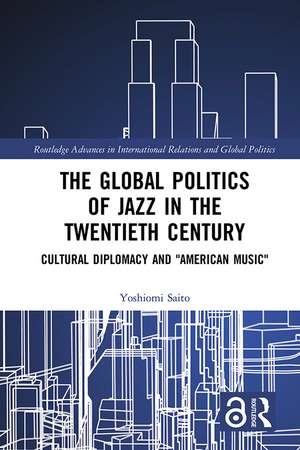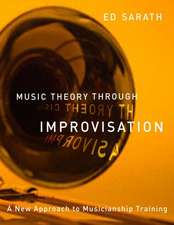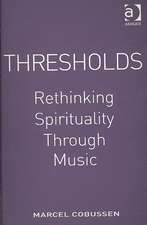The Global Politics of Jazz in the Twentieth Century: Cultural Diplomacy and "American Music": Routledge Advances in International Relations and Global Politics
Autor Yoshiomi Saitoen Limba Engleză Hardback – 30 aug 2019
Saito examines jazz across a wide range of regions, including America, Europe, Japan and Communist countries. His research also draws heavily upon a variety of sources, primary as well as secondary, which are accessible in these diverse countries: all had their unique and culturally specific domestic jazz scenes, but also interacted with each other in an interesting dimension of early globalization. This comparative analysis on the range of unique jazz scenes and cultures offers a detailed understanding as to how jazz has been interpreted in various ways, according to the changing contexts of politics and society around it, often providing a basis for criticizing America itself. Furthering our appreciation of the organic relationship between jazz and global politics, Saito reconsiders the uniqueness of jazz as an exclusively "American music."
This book will be of interest to students and scholars of international relations, the history of popular music, and global politics.
The Introduction of this book is freely available as a downloadable Open Access PDF at http://www.taylorfrancis.com under a Creative Commons Attribution-Non Commercial-No Derivatives (CC-BY-NC-ND) 4.0 license.
| Toate formatele și edițiile | Preț | Express |
|---|---|---|
| Paperback (1) | 383.12 lei 6-8 săpt. | |
| Taylor & Francis – 30 iun 2021 | 383.12 lei 6-8 săpt. | |
| Hardback (1) | 1000.27 lei 6-8 săpt. | |
| Taylor & Francis – 30 aug 2019 | 1000.27 lei 6-8 săpt. |
Din seria Routledge Advances in International Relations and Global Politics
-
 Preț: 383.48 lei
Preț: 383.48 lei -
 Preț: 310.55 lei
Preț: 310.55 lei -
 Preț: 188.83 lei
Preț: 188.83 lei -
 Preț: 152.86 lei
Preț: 152.86 lei -
 Preț: 311.59 lei
Preț: 311.59 lei - 9%
 Preț: 1003.12 lei
Preț: 1003.12 lei -
 Preț: 317.91 lei
Preț: 317.91 lei - 8%
 Preț: 390.08 lei
Preț: 390.08 lei -
 Preț: 377.82 lei
Preț: 377.82 lei -
 Preț: 303.47 lei
Preț: 303.47 lei - 18%
 Preț: 1170.74 lei
Preț: 1170.74 lei - 18%
 Preț: 1051.55 lei
Preț: 1051.55 lei - 18%
 Preț: 1220.46 lei
Preț: 1220.46 lei - 28%
 Preț: 850.99 lei
Preț: 850.99 lei - 18%
 Preț: 1056.32 lei
Preț: 1056.32 lei - 18%
 Preț: 1053.57 lei
Preț: 1053.57 lei - 18%
 Preț: 1057.89 lei
Preț: 1057.89 lei - 18%
 Preț: 1056.32 lei
Preț: 1056.32 lei - 18%
 Preț: 1066.09 lei
Preț: 1066.09 lei - 18%
 Preț: 1062.26 lei
Preț: 1062.26 lei - 18%
 Preț: 1056.32 lei
Preț: 1056.32 lei - 15%
 Preț: 449.41 lei
Preț: 449.41 lei - 25%
 Preț: 300.01 lei
Preț: 300.01 lei - 18%
 Preț: 1167.36 lei
Preț: 1167.36 lei - 28%
 Preț: 820.56 lei
Preț: 820.56 lei - 18%
 Preț: 1060.87 lei
Preț: 1060.87 lei - 18%
 Preț: 1270.98 lei
Preț: 1270.98 lei - 18%
 Preț: 1167.71 lei
Preț: 1167.71 lei - 18%
 Preț: 1112.21 lei
Preț: 1112.21 lei - 18%
 Preț: 997.11 lei
Preț: 997.11 lei -
 Preț: 427.12 lei
Preț: 427.12 lei - 18%
 Preț: 1057.40 lei
Preț: 1057.40 lei -
 Preț: 355.58 lei
Preț: 355.58 lei - 18%
 Preț: 1057.75 lei
Preț: 1057.75 lei - 18%
 Preț: 1115.33 lei
Preț: 1115.33 lei - 18%
 Preț: 1052.89 lei
Preț: 1052.89 lei - 26%
 Preț: 850.37 lei
Preț: 850.37 lei -
 Preț: 389.38 lei
Preț: 389.38 lei - 18%
 Preț: 1120.55 lei
Preț: 1120.55 lei - 18%
 Preț: 1059.93 lei
Preț: 1059.93 lei - 18%
 Preț: 1059.84 lei
Preț: 1059.84 lei - 18%
 Preț: 951.96 lei
Preț: 951.96 lei - 18%
 Preț: 1058.79 lei
Preț: 1058.79 lei - 18%
 Preț: 1061.81 lei
Preț: 1061.81 lei - 48%
 Preț: 572.55 lei
Preț: 572.55 lei - 18%
 Preț: 1059.84 lei
Preț: 1059.84 lei - 18%
 Preț: 1000.27 lei
Preț: 1000.27 lei - 18%
 Preț: 1056.28 lei
Preț: 1056.28 lei - 18%
 Preț: 1057.75 lei
Preț: 1057.75 lei
Preț: 1000.27 lei
Preț vechi: 1219.84 lei
-18% Nou
Puncte Express: 1500
Preț estimativ în valută:
191.41€ • 204.67$ • 159.59£
191.41€ • 204.67$ • 159.59£
Carte tipărită la comandă
Livrare economică 17 aprilie-01 mai
Preluare comenzi: 021 569.72.76
Specificații
ISBN-13: 9780367182984
ISBN-10: 036718298X
Pagini: 208
Dimensiuni: 156 x 234 x 18 mm
Greutate: 0.45 kg
Ediția:1
Editura: Taylor & Francis
Colecția Routledge
Seria Routledge Advances in International Relations and Global Politics
Locul publicării:Oxford, United Kingdom
ISBN-10: 036718298X
Pagini: 208
Dimensiuni: 156 x 234 x 18 mm
Greutate: 0.45 kg
Ediția:1
Editura: Taylor & Francis
Colecția Routledge
Seria Routledge Advances in International Relations and Global Politics
Locul publicării:Oxford, United Kingdom
Public țintă
Postgraduate and UndergraduateCuprins
Acknowledgements
Abbreviations
Introduction
1 The genealogy of “American music”
2 The scene changes in postwar jazz politics
3 Jazz ambassadors revisited
4 The politics behind the selection process
5 Anti-Americanism in the Western jazz discourse
6 Containing the Soviet jazz scene
7 Contesting discourses in East European jazz scenes
8 Making jazz great again
Conclusion
Bibliography
Index
Abbreviations
Introduction
1 The genealogy of “American music”
2 The scene changes in postwar jazz politics
3 Jazz ambassadors revisited
4 The politics behind the selection process
5 Anti-Americanism in the Western jazz discourse
6 Containing the Soviet jazz scene
7 Contesting discourses in East European jazz scenes
8 Making jazz great again
Conclusion
Bibliography
Index
Notă biografică
Yoshiomi Saito is Associate Professor in the Graduate School of Human and Environmental Studies at Kyoto University, Japan.
Descriere
This comparative analysis on the range of jazz scenes and cultures offers a detailed evaluation as to why jazz diplomacy succeeded in certain countries and periods, but failed in others. Furthering our understanding of the organic relationship between jazz and global politics, Saito re-evaluates jazz as an exclusively ‘American music’.






















